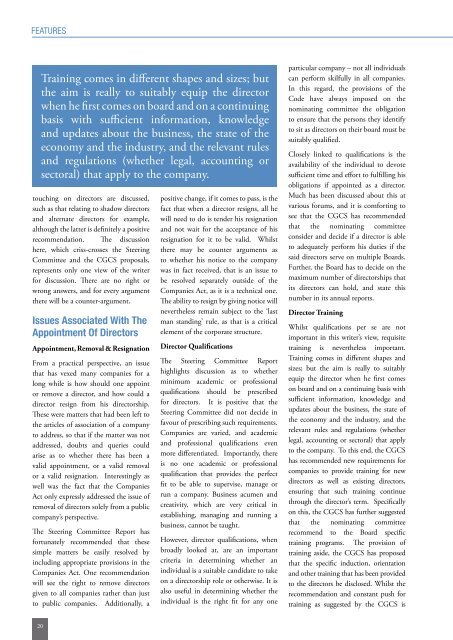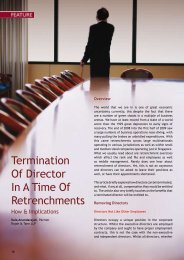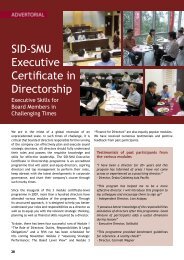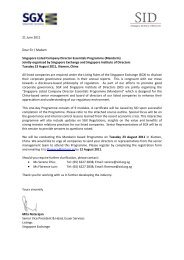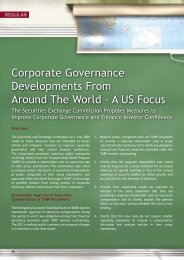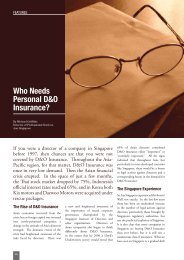FEATURESTraining comes in different shapes and sizes; butthe aim is really to suitably equip the directorwhen he first comes on board and on a continuingbasis with sufficient information, knowledgeand updates about the business, the state <strong>of</strong> theeconomy and the industry, and the relevant rulesand regulations (whether legal, accounting orsectoral) that apply to the company.touching on directors are discussed,such as that relating to shadow directorsand alternate directors for example,although the latter is definitely a positiverecommendation. The discussionhere, which criss-crosses the SteeringCommittee and the CGCS proposals,represents only one view <strong>of</strong> the writerfor discussion. There are no right orwrong answers, and for every argumentthere will be a counter-argument.Issues Associated With TheAppointment Of <strong>Directors</strong>Appointment, Removal & ResignationFrom a practical perspective, an issuethat has vexed many companies for along while is how should one appointor remove a director, and how could adirector resign from his directorship.These were matters that had been left tothe articles <strong>of</strong> association <strong>of</strong> a companyto address, so that if the matter was notaddressed, doubts and queries couldarise as to whether there has been avalid appointment, or a valid removalor a valid resignation. Interestingly aswell was the fact that the CompaniesAct only expressly addressed the issue <strong>of</strong>removal <strong>of</strong> directors solely from a publiccompany’s perspective.The Steering Committee Report hasfortunately recommended that thesesimple matters be easily resolved byincluding appropriate provisions in theCompanies Act. One recommendationwill see the right to remove directorsgiven to all companies rather than justto public companies. Additionally, apositive change, if it comes to pass, is thefact that when a director resigns, all hewill need to do is tender his resignationand not wait for the acceptance <strong>of</strong> hisresignation for it to be valid. Whilstthere may be counter arguments asto whether his notice to the companywas in fact received, that is an issue tobe resolved separately outside <strong>of</strong> theCompanies Act, as it is a technical one.The ability to resign by giving notice willnevertheless remain subject to the ‘lastman standing’ rule, as that is a criticalelement <strong>of</strong> the corporate structure.Director QualificationsThe Steering Committee Reporthighlights discussion as to whetherminimum academic or pr<strong>of</strong>essionalqualifications should be prescribedfor directors. It is positive that theSteering Committee did not decide infavour <strong>of</strong> prescribing such requirements.Companies are varied, and academicand pr<strong>of</strong>essional qualifications evenmore differentiated. Importantly, thereis no one academic or pr<strong>of</strong>essionalqualification that provides the perfectfit to be able to supervise, manage orrun a company. Business acumen andcreativity, which are very critical inestablishing, managing and running abusiness, cannot be taught.However, director qualifications, whenbroadly looked at, are an importantcriteria in determining whether anindividual is a suitable candidate to takeon a directorship role or otherwise. It isalso useful in determining whether theindividual is the right fit for any oneparticular company – not all individualscan perform skilfully in all companies.In this regard, the provisions <strong>of</strong> theCode have always imposed on thenominating committee the obligationto ensure that the persons they identifyto sit as directors on their board must besuitably qualified.Closely linked to qualifications is theavailability <strong>of</strong> the individual to devotesufficient time and effort to fulfilling hisobligations if appointed as a director.Much has been discussed about this atvarious forums, and it is comforting tosee that the CGCS has recommendedthat the nominating committeeconsider and decide if a director is ableto adequately perform his duties if thesaid directors serve on multiple Boards.Further, the Board has to decide on themaximum number <strong>of</strong> directorships thatits directors can hold, and state thisnumber in its annual reports.Director TrainingWhilst qualifications per se are notimportant in this writer’s view, requisitetraining is nevertheless important.Training comes in different shapes andsizes; but the aim is really to suitablyequip the director when he first comeson board and on a continuing basis withsufficient information, knowledge andupdates about the business, the state <strong>of</strong>the economy and the industry, and therelevant rules and regulations (whetherlegal, accounting or sectoral) that applyto the company. To this end, the CGCShas recommended new requirements forcompanies to provide training for newdirectors as well as existing directors,ensuring that such training continuethrough the director’s term. Specificallyon this, the CGCS has further suggestedthat the nominating committeerecommend to the Board specifictraining programs. The provision <strong>of</strong>training aside, the CGCS has proposedthat the specific induction, orientationand other training that has been providedto the directors be disclosed. Whilst therecommendation and constant push fortraining as suggested by the CGCS is20
good, thankfully the Steering Committeeshied away from mandating the training <strong>of</strong>directors generally. If such a requirementhad been introduced, it would have beena vexed provision difficult to enforce andso toothless, or there would have beentoo many directors simply violating therequirements.Director IndependenceThe discussion on director qualificationsleads on nicely into the independence <strong>of</strong>directors, as the Code requires a certainpercentage <strong>of</strong> the board <strong>of</strong> a listedcompany to be independent. The CGCShas sought to tighten the definition <strong>of</strong>independence by proposing additionsto the current Code further instancesas to when a director is deemed to benon-independent. These include thefollowing circumstances:• where the director is or was, inthe current or any <strong>of</strong> the pastthree financial years, a substantialshareholder, partner, executive<strong>of</strong>ficer, or director <strong>of</strong> organisationsto which the company or any <strong>of</strong> itsrelated corporations made, or receivedsignificant payments or materialservices in the current or immediatepast financial year;• where the director is a substantialshareholder or immediate familymember <strong>of</strong> a substantial shareholder<strong>of</strong> the company;• where the director is or has beendirectly associated with a substantialshareholder <strong>of</strong> the company in thecurrent or any <strong>of</strong> the past threefinancial years; or• where the director has served on theBoard for more than nine years fromthe date <strong>of</strong> his or her first election.On these new proposed inclusions,comments on whether a director who isassociated in any way whatsoever witha substantial shareholder (which refersto a shareholder who owns 5% or more<strong>of</strong> the shares <strong>of</strong> the company) shouldlose his independence are reserved.However, the extended time period thata director spends on a board potentiallymaking him lose independence is agood addition, although some arguethat nine years is an arbitrary numberand that it is fairly easy to circumvent.This is not a novel provision and existsin the UK for example, as well as underthe corporate governance regulations forfinancial institutions in <strong>Singapore</strong>. Thelength <strong>of</strong> period is relatively arbitrarilyarrived at, but broadly looks at a directorspending no more than 3 years <strong>of</strong> 3terms each on a board. The MaldivesCorporate Governance Code, when firstintroduced, had set the term at 6 years.All said, one key aim is really to avoidgroupthink, although <strong>of</strong> course this isnot the sole purpose for the introduction<strong>of</strong> this requirement.Comforting is the fact that as under thecurrent Code, the situations where adirector is deemed to be non-independentis not exhaustive. Consequently, acompany whose directors fall within one<strong>of</strong> the listed circumstances may, throughits nominating committee, providejustifications as to why the said directorsare independent.Apart from the deeming provisions inthe Code, the proposed revisions furtherprovide that independent directorsshould make up half <strong>of</strong> the Board where:• the Chairman <strong>of</strong> the Board and theChief Executive Officer <strong>of</strong> the Boardis the same person;• the Chairman <strong>of</strong> the Board and theChief Executive Officer <strong>of</strong> the Boardare immediate family members;• the Chairman <strong>of</strong> the Board and theChief Executive Officer <strong>of</strong> the Boardare both part <strong>of</strong> the managementteam; or• the Chairman <strong>of</strong> the Board is not anindependent director.Whilst on the one hand, these changesseemingly brings <strong>Singapore</strong> in line withinternational standards, taking a stepback, given the traditional corporatestructure and the fact <strong>of</strong> the prevalence<strong>of</strong> concentrated shareholding structuresin <strong>Singapore</strong>, one wonders whether thetighter definition will do much to changethe manner in which governance prevailsor is managed or is implemented incompanies. One might, however, argue(convincingly or otherwise) that, viewedholistically, this particular tightening <strong>of</strong>the definition <strong>of</strong> independent directorsworks in tandem with the proposedchange by the Steering Committee toexpressly provide in section 157A thatdirectors can be responsible for just thesupervision <strong>of</strong> the management <strong>of</strong> theCompany, in that a more independentboard will be able to better supervise theaffairs <strong>of</strong> the company (this particularissue is discussed below).<strong>Directors</strong>’ Duties RelatedIssuesSupervisory Role Of <strong>Directors</strong>A much debated issue has always beenwhat the role <strong>of</strong> a director is. Is it one <strong>of</strong>oversight or is it one <strong>of</strong> managing or is ita combination <strong>of</strong> the two. Prior to theintroduction <strong>of</strong> section 157A into theCompanies Act in or about 2003, andeven after the introduction <strong>of</strong> section157A into the Companies Act, theposition at law has arguably been that adirector is responsible for managing thecompany as well as its oversight. Thiswas a dual role. Whilst the directorcould not abdicate his duties, he coulddelegate some <strong>of</strong> these functions tomanagement type persons to perform.Presumably to satisfy a business callto arguably reflect the reality <strong>of</strong> howdirectors perform their functionsin the boardroom, the proposal toallow for the business <strong>of</strong> the companyto simply be managed, inter alia,under the supervision <strong>of</strong> the directorshas been introduced. Whilst thisrecommendation is not unlike that whichexists in many countries where there aredual boards, the structure is different.Hence, a question to ask is whether suchan approach can indeed work within thetraditional corporate structure, and yetallow for the continued growth <strong>of</strong> goodcorporate governance.21


